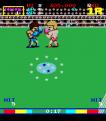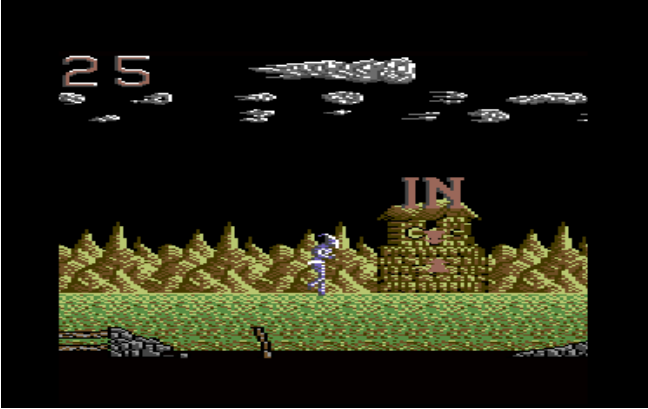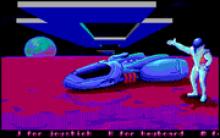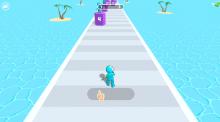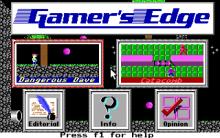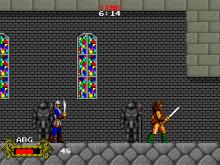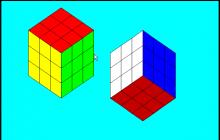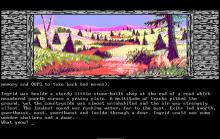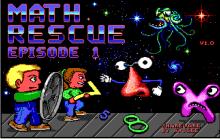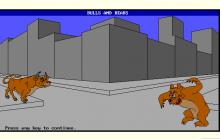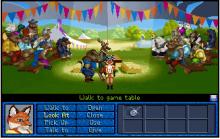Shadow of the Beast
|
|
||||||||
If using USB Joystick/Gamepad, you can plug the controller in the USB port once the game is loaded for best results.
How to play Shadow of the Beast
Each game uses different controls, Games can have combination of mouse,keyboard and Joystick.
Shadow of the Beast Description
Shadow of the Beast is a side-scrolling platform computer game produced by Reflections Interactive and published by Psygnosis in 1989.
Originally released on the Commodore Amiga, its success launched a number of ports of the game to almost all other home computer systems and video games consoles of the time, including the IBM PC, Atari ST, Amstrad CPC, C64, ZX Spectrum, SNES, Sega Genesis, Sega Master System, Atari Lynx and TG16. A later version with improved graphics and sounds was released in 1991 for the FM-Towns under the title Shadow Of The Beast Complete.
Psygnosis had published numerous side scollers with nice looking graphics before (most notably Obliterator), but Shadow of the Beast was anyway a jaw-dropping experience for many since now the beauty of graphics (with many more colours on screen and multiple levels of parallax scrolling backdrops) seemed to be something that was not seen before in action games. In addition Beast had a stunning soundtrack composed by David Whittaker using good-quality instrument samples that fitted in the game's atmosphere perfectly. Some reviewers complained the game being very difficult but for many gamers this was not a problem and the game became a huge hit. However, since the game tried to stretch Amiga's (which was maybe the most technically advanced gaming machine still in 1989) graphic and sound capabilities to their utter maximum the conversions for other ports were usually far less satisfying experiences.
The box artwork of the game, in common with many Psygnosis releases of the time, was created by acclaimed fantasy artist Roger Dean, in a style reminicent of his Yes band artwork.
The game's story concerns a man named Aarbron, kidnapped as a child and corrupted through magic into a warrior creature acting as as executioner in the service of the evil beast lord, Malatoth. The creature's memory of his human life returns when he is ordered to execute a prisoner who he realises is his father, prompting him to seek revenge.
There were two sequels for the game: Shadow of the Beast II in 1990 and Shadow of the Beast III in 1992. The former was again ported to a number of platforms.
Shadow of the Beast II finds the hero in half-beast form, wandering the lands of Karamoon in search of his kidnapped sister. She had been taken away from her mother's cottage by the dragon-form of the Beast Mage, Zelek, servant to Maletoth. Along the way, Aarbron befriends the wise dragon Barloom, and must defeat the evil dragon Ishran. Tree Pygmies in the forest and the goblins in the Crystal Caverns provide for interactive, complicated foes. For example, a drink of booze picked up at the Karamoon oasis must be given to the goblin jailer to free Aarbron from his cell. Only after Aarbron gives the old man his ring and his parchment does he achieve a spell-attack powerful enough to defeat Zelek. Even so, the game is quite impossible and the player will quite likely have to cheat to see more than a fraction of it, by asking the first Pygmy to his right about "ten pints".
The cover art for Shadow of the Beast II was done by Roger Dean and the game was packaged with a promotional black T-Shirt with Roger Dean's artwork. The tribal music of Beast II was composed by Tim Wright and additional music for the project is available from his Cold Storage website.
The final chapter of the saga, Shadow of the Beast III was released for Amiga in 1992. It did not get so much attention as its predecessors. Its graphics and sound - though still high quality - were not revolutionary anymore in 1992 but the game was anyway considered to be fine in most of reviews. Beast III had four distinct stages instead of one big area. It also had more puzzles than previous Beasts. The tricky puzzles actually form the core of the game. Compared to Beast II the game-play and difficulty level were now quite well adjusted. Beast III package did not contain a T-shirt, but a badge with a game logo instead.

Shadow of the Beast - additional information





